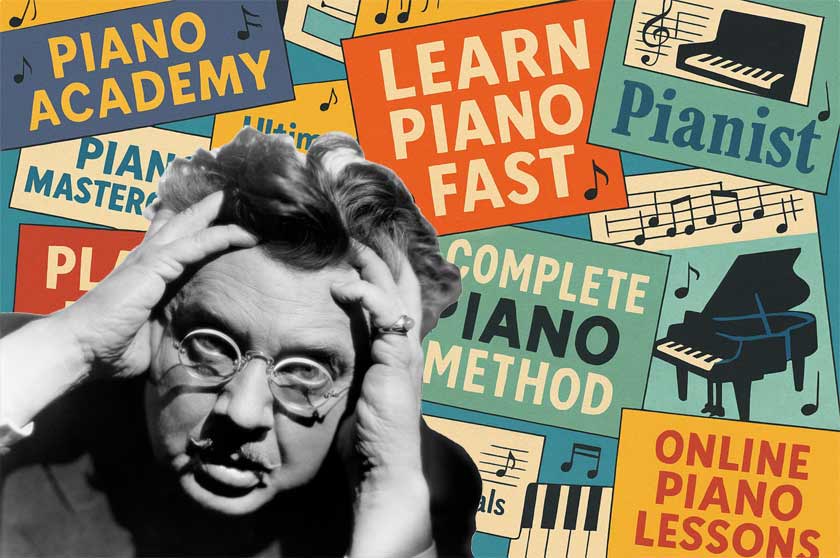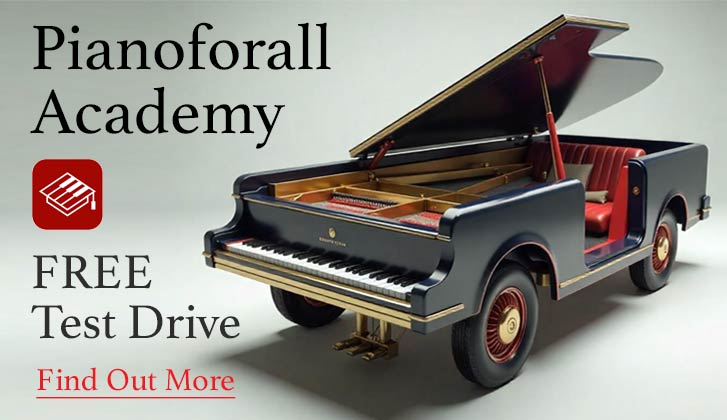Why Most Courses Expect Too Much from Beginners
Most online piano courses promise you the dream — your dream — of playing piano in no time at all. And honestly, I want to give you that dream too. The difference is, I’ve designed my course so it’s actually achievable, even if you’ve never touched a piano before.
When you watch the typical course promo videos, you’ll see someone playing songs straight away. That’s fun to watch… but there’s a catch. Learning a handful of songs doesn’t mean you’ve learned the language of music — the building blocks that make it all work.
It’s a bit like trying to learn a foreign language by memorising a poem or story. You might sound great reciting it, but will you be able to have a conversation? Probably not.
The only way to truly learn is like a child does — baby steps. First single words or letters, then simple sentences, then paragraphs. And all along, understanding how and why it all fits together. That’s how you reach the point where you can “speak” music fluently.
That’s exactly how Pianoforall teaches. I start from the absolute basics, assuming you know nothing. I don’t jump straight into complicated patterns or flashy arrangements just for you to copy — because what’s the point if you don’t understand what you’re doing?
Instead, I teach in tiny baby steps — but every step is designed to sound interesting. If it’s boring, you’ll lose motivation. And trust me, it took me 10 years to develop lessons that keep beginners hooked from the very start.
Online Piano Courses vs Traditional Teaching
I’m not against traditional piano lessons. Sitting beside a teacher in person can be invaluable. But I’ve seen a lot of “old school” teachers who rely heavily on scales, finger drills, and sight reading, with no mention of chords, rhythm style, or popular music.
For some kids, that approach works fine. But for others — especially adult learners — it’s uninspiring at best and discouraging at worst.
If you’re thinking about hiring a face-to-face teacher, ask them up front:
- Do they teach chords and rhythm, or is it purely sheet music?
- Will you start with music you actually want to play?
- Do they combine traditional skills with more modern, pattern-based playing?
If they offer a healthy balance, great. If not, and you want to play for fun and enjoyment, you might be better off with an approach like Pianoforall.
Why Most Piano Courses Just Don’t Work for Complete Beginners
I’ve looked at many of the big-name piano courses out there. The thing I’ve noticed? Most are aimed at people who can already play “a bit.”
The teachers are often excellent players with infectious enthusiasm — but if you’re a total beginner, it can feel overwhelming.
When you’re starting from scratch, even playing the correct fingers for a basic chord can be tricky. Your wrists might ache after just a few minutes. It can take days, even weeks, to feel comfortable with the simplest patterns.
Most courses skim over this stage. They assume you can keep up. But if you can’t, it’s easy to feel like you’re “not musical” — which simply isn’t true.
This is where Pianoforall really shines. We break things down into manageable steps, and — more importantly — give you interesting ways to practice those steps over and over until they become second nature.
Because the truth is, learning piano isn’t about memorising flashy songs. It’s about building a foundation so solid that when you do play those songs, they sound effortless.
Also make sure your instrument isn’t holding you back: keyboard buying guide.



